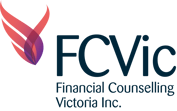Please tell us about your background:
I began my career in the community sector as a youth housing support worker at 25. At the time, I was a single parent with two children and I was a community development student.
Given the position was in regional Victoria and I was the only direct service youth worker in the 874 sq km area, with my life circumstances, my learning curve was steep and fast.
Before beginning in financial counselling, I had a varied background including mental health, program coordination, case management and community development project roles.
What motivated you to pursue financial counselling?
I was working as a mental health support worker and Peter Gartlan and I shared a client. Peter told me that there was an opening for a financial counsellor and it just happened that the timing was right, as I was looking for a new challenge. However, Peter did not really paint a fair picture of the role or indicate that the role could be quite challenging. I was particularly attracted to the position because it was solution focused and a role where case work and systemic advocacy meet, as well as being underpinned by community development principles and social justice, two of my very favourite things.
Please tell us a bit about your work within the Integrated Services Project with SSRV.
I have learned so much about Centrelink and the underpinning legislation, it has provided so much insight into Centrelink decisions and why they are made. It has been a really enjoyable experience- working so closely with lawyers on cases and seeing the advantages for clients that come out of integrated practice. The project to date has seen so many great outcomes for clients and now we have secured a second year of funding, I am excited to see what comes next.
What are the unique aspects of your role or the area you work in?
Like most financial counselling work, each case is very individual. However, I am enjoying working with the asylum seekers and refugees as this is not an area that I have had a lot of exposure to.
What has been your proudest achievement to date?
I don’t think that I can pick one thing, however I am always impressed to see how debt waivers can change clients\’ lives. I am always really amazed by how clients trust us with their lives and I always like to remember that it is a privilege to work with vulnerable people.
Essentially I am always proud of the awesome work that the sector does with the wider community.
What do you see as the biggest challenge facing the financial counselling sector?
I can’t pick one, so my top two are:
Resources – there is just not enough funding or financial counsellors to meet demand for service.
The need for specialised financial counsellors to be available to provide service to people in hospitals and aged care facilities.
What has been the most valuable resource or advice you’ve received?
Being non-judgemental is not about not having judgement, as without judgement we are unable to moderate our own behaviour. Being non-judgemental is being able to identify our own biases and treat people with the same unconditional positive regard, regardless of their values or behaviour. This allows others to make their own decisions and choices without fear of being judged; this is best practice and not just with our clients but also our colleagues, family, friends and the rest of the world.
What book are you reading at the moment?
I am currently listening an audio book called The Mabinogion, this is a collection of Celtic myths and ancient Welsh tales, some were written as early as the 11th Century.
What is your favourite podcast?
I usually listen to the podcast called Talking Health on 3AW hosted by Dr Sally Cockburn. She has a variety of different guests and the show is about demystifying medical issues.
